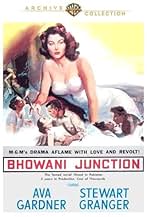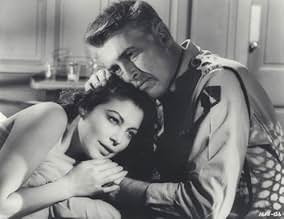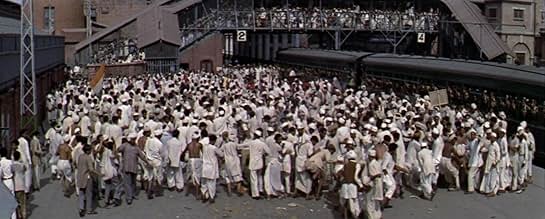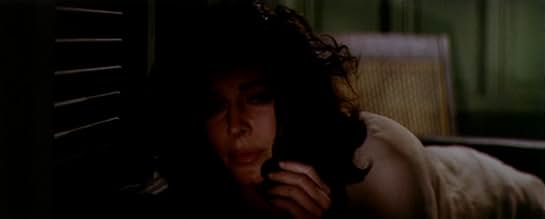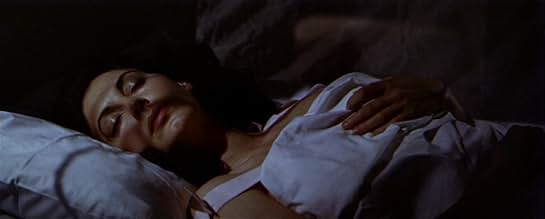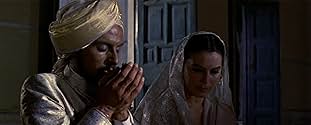IMDb-BEWERTUNG
6,4/10
2205
IHRE BEWERTUNG
Füge eine Handlung in deiner Sprache hinzuAnglo-Indian Victoria Jones seeks her true identity amid the chaos of the British withdrawal from India.Anglo-Indian Victoria Jones seeks her true identity amid the chaos of the British withdrawal from India.Anglo-Indian Victoria Jones seeks her true identity amid the chaos of the British withdrawal from India.
- Regie
- Drehbuch
- Hauptbesetzung
- Nominiert für 1 BAFTA Award
- 2 Nominierungen insgesamt
Ronald Adam
- General Ackerby
- (Nicht genannt)
Anthony Bushell
- Lanson
- (Nicht genannt)
Eric Corrie
- Man-at-Arms
- (Nicht genannt)
George Cukor
- Man on Train
- (Nicht genannt)
Roger Delgado
- Train Driver
- (Nicht genannt)
Dharma Emmanuel
- Sentry
- (Nicht genannt)
Raymond Francis
- Captain Cumberly
- (Nicht genannt)
Empfohlene Bewertungen
The setting for Bhowani Junction is India during the last days of the British Raj. The town of Bhowani is a railroad junction and both the Congress Party and the Communist Party are doing all kinds of sabotage to help the British quickly get out of India. Of course each is doing it for their own reasons.
Two people who may have given the outstanding performances of their careers are Ava Gardner and Bill Travers. Both play bi-racial people who don't fit in either society. But they react differently. Gardner is going through a whole lot of angst, really seeing both the British and Indian point of view. How she missed an Oscar nomination here is beyond me.
Bill Travers is the railroad station manager and his whole life is his job. He focuses narrowly on that and his tunnel vision leaves him oblivious to the momentous changes around him. Except for the fact that when the British leave he might lose that little piece of authority where he is, that which gives him stature in the Raj society.
The issues are complex, but in the hands of a great director like George Cukor the characters and their struggles become real and even more important, the audience becomes interested.
Stewart Granger who was the British Colonel in charge of the whole mess in Bhowani, said that Bhowani Junction was one of the few films he was really proud to be associated with. He has a struggle to, he really does see the Indians as human beings and not just "wogs." He's quite knowledgeable about their customs and at one point utilizes that knowledge to unjam that railroad terminal.
Bhowani Junction is an intelligent and literate drama and a superb piece of film making.
Two people who may have given the outstanding performances of their careers are Ava Gardner and Bill Travers. Both play bi-racial people who don't fit in either society. But they react differently. Gardner is going through a whole lot of angst, really seeing both the British and Indian point of view. How she missed an Oscar nomination here is beyond me.
Bill Travers is the railroad station manager and his whole life is his job. He focuses narrowly on that and his tunnel vision leaves him oblivious to the momentous changes around him. Except for the fact that when the British leave he might lose that little piece of authority where he is, that which gives him stature in the Raj society.
The issues are complex, but in the hands of a great director like George Cukor the characters and their struggles become real and even more important, the audience becomes interested.
Stewart Granger who was the British Colonel in charge of the whole mess in Bhowani, said that Bhowani Junction was one of the few films he was really proud to be associated with. He has a struggle to, he really does see the Indians as human beings and not just "wogs." He's quite knowledgeable about their customs and at one point utilizes that knowledge to unjam that railroad terminal.
Bhowani Junction is an intelligent and literate drama and a superb piece of film making.
Well, I've always sort of identified myself as an AngloBanglo.
My dad was born in Lahore in 1929 and my grandparents left Karachi in 1965 almost 20 years after partition because the Muslims had made it impossible for my Nana to continue to run her private school.
The returned to England like so many AngloBanglos where they were too Indian for the white and not Indian enough for the Indians.
Just like they were back in what was then Pakistan and by some account, India itself.
You have to remember that at this point, as depicted in the film, 1947 was the cusp of partition and violence was everywhere. My grandfather told me graphic stories of entire trains of people slaughtered he had witnessed.
Ava Gardner's character has to choose which side she is on but for many AngloBanglos the struggle goes on. We are neither brown enough for the browns, nor white enough for the whites. I now live in Canada but I self identify as English.
The sub text in George Cukor's story has lost some of it's impact over time because few remember the upheaval of partition but for some of us, it bring it back into focus.
More interesting to me is that it was released the year I was born, in England, in 1956.
My dad was born in Lahore in 1929 and my grandparents left Karachi in 1965 almost 20 years after partition because the Muslims had made it impossible for my Nana to continue to run her private school.
The returned to England like so many AngloBanglos where they were too Indian for the white and not Indian enough for the Indians.
Just like they were back in what was then Pakistan and by some account, India itself.
You have to remember that at this point, as depicted in the film, 1947 was the cusp of partition and violence was everywhere. My grandfather told me graphic stories of entire trains of people slaughtered he had witnessed.
Ava Gardner's character has to choose which side she is on but for many AngloBanglos the struggle goes on. We are neither brown enough for the browns, nor white enough for the whites. I now live in Canada but I self identify as English.
The sub text in George Cukor's story has lost some of it's impact over time because few remember the upheaval of partition but for some of us, it bring it back into focus.
More interesting to me is that it was released the year I was born, in England, in 1956.
Loving drama set in the year is 1947, when the British are on the verge of giving independence India
Spectacular screen translation of John Masters' novel carried out by M-G-M set in post -colonial India. This is a drama aflame with Love And Revolt . Anglo-Indian Victoria Jones seeks her true identity amid the chaos of the British withdrawal from India . Meanwhile , Indu Victoria to be courted by three suitors , Col. Rodney Savage (Stewart Granger , this role gave hem a strenuous time along with Scaramouche , Beau Brummell and Moonfleet) , Ranjit Kasel (Francis Matthews) and Patrick Taylor (Bill Travers , though Sabu tested for, and was nearly cast in the role) .
This dramatic picture contains a meaty plot , thrills , unrest , violence , love and historical events dealing with pre-independence India . This colorful picture gave Ava Gardner , Stewart Granger and co-stars a good time . Stewart Granger is fine as a colonel who falls in love for Ava . Gorgeous Ava Gardner as a half-English , half-Indian woman who is torn between the British officer she loves and her country . Gardner was trampled on by more than 200 native extras , then shaken and bruised in a staged fight with soldiers ; some years later , Ava declared it the toughest picture she ever worked on . Support cast is frankly well , such as Abraham Sofaer as Surabhai , Lionel Jeffries as Lt. Graham McDaniel , Freda Jackson as Sandani , Peter Illing as Ghanshyam and Francis Matthews who said in interviews that huge chunks of his part ended up on the cutting room floor ; in addition , Edward Chapman was hired to play Jones after the scenes had been shot with another actor playing the role . Furthermore , a right make-up to appear American actors like Indian people .
Evocative as well as glowing cinematography by Freddie Young shot on location in Pakistan . The filming took place in Pakistan rather than India for political reasons due to the scenes of Hindu terrorism including against Ghandi himself. Emotive and intense musical score by the classic Miklos Rozsa . The motion picture was well directed by George Cukor , though contains some flaws . This excellent filmmaker directed 20 different actors in Oscar-nominated performances . Cukor enjoyed a successful working partnership with Katharine Hepburn, directing her in ten films over a period of 47 years such as ¨Little women¨, ¨The Philadelphia story¨, ¨Adam's rib¨ , ¨Pat and Mike¨, among others . He was often regarded as a "women's director" because his films frequently are centered around strong female characters . Cukor directed many adaptations of books & plays and was known to be particularly skilled at interpreting stage plays for the screen .
This dramatic picture contains a meaty plot , thrills , unrest , violence , love and historical events dealing with pre-independence India . This colorful picture gave Ava Gardner , Stewart Granger and co-stars a good time . Stewart Granger is fine as a colonel who falls in love for Ava . Gorgeous Ava Gardner as a half-English , half-Indian woman who is torn between the British officer she loves and her country . Gardner was trampled on by more than 200 native extras , then shaken and bruised in a staged fight with soldiers ; some years later , Ava declared it the toughest picture she ever worked on . Support cast is frankly well , such as Abraham Sofaer as Surabhai , Lionel Jeffries as Lt. Graham McDaniel , Freda Jackson as Sandani , Peter Illing as Ghanshyam and Francis Matthews who said in interviews that huge chunks of his part ended up on the cutting room floor ; in addition , Edward Chapman was hired to play Jones after the scenes had been shot with another actor playing the role . Furthermore , a right make-up to appear American actors like Indian people .
Evocative as well as glowing cinematography by Freddie Young shot on location in Pakistan . The filming took place in Pakistan rather than India for political reasons due to the scenes of Hindu terrorism including against Ghandi himself. Emotive and intense musical score by the classic Miklos Rozsa . The motion picture was well directed by George Cukor , though contains some flaws . This excellent filmmaker directed 20 different actors in Oscar-nominated performances . Cukor enjoyed a successful working partnership with Katharine Hepburn, directing her in ten films over a period of 47 years such as ¨Little women¨, ¨The Philadelphia story¨, ¨Adam's rib¨ , ¨Pat and Mike¨, among others . He was often regarded as a "women's director" because his films frequently are centered around strong female characters . Cukor directed many adaptations of books & plays and was known to be particularly skilled at interpreting stage plays for the screen .
This is a beautifully shot, and well acted movie. It is almost faithful to the book and a good portrait of the chaos at the end of the second world war. Ava Gardner is luminous as always, and Stewart Granger a good foil for her.
Produced barely a handful of years after the tumultuous period in question, the film delves further into events and attitudes that would have been comparatively unfamiliar to North American audiences - perhaps explaining, in part, its middling box office performance.
One can only speculate as to whether the project was part of a Cold War ploy to woo India away from its affection for Russia; however, dialogue early on does make specific reference to worries about Russian influence. If there's any validity to that speculation, then its ambitions extended beyond the box office (and might have been realized..?).
I agree with those commending director Cukor for his handling of the wide screen spectacle and action. I suspect that Richard Attenborough took notes from Cukor's visual approach in pre-planning his "Gandhi." Yes, other directors (e.g., Victor Fleming, Gone With the Wind, to mention but one) achieved more memorable tableaux; but this was an honourable entry in a still-evolving format at the time.
I'll yield to others' opinions on the performances - with the exception that I found Bill Travers's character and his portrayal were a one-note annoyance throughout. I mean, at least get a dialogue coach and find a credible accent, already!
It would be interesting to recover Cukor's original cut of the film, notwithstanding the apparently negative audience reactions at the time. The voice over post-facto narrative technique the studio imposed was hackneyed even then.
One can only speculate as to whether the project was part of a Cold War ploy to woo India away from its affection for Russia; however, dialogue early on does make specific reference to worries about Russian influence. If there's any validity to that speculation, then its ambitions extended beyond the box office (and might have been realized..?).
I agree with those commending director Cukor for his handling of the wide screen spectacle and action. I suspect that Richard Attenborough took notes from Cukor's visual approach in pre-planning his "Gandhi." Yes, other directors (e.g., Victor Fleming, Gone With the Wind, to mention but one) achieved more memorable tableaux; but this was an honourable entry in a still-evolving format at the time.
I'll yield to others' opinions on the performances - with the exception that I found Bill Travers's character and his portrayal were a one-note annoyance throughout. I mean, at least get a dialogue coach and find a credible accent, already!
It would be interesting to recover Cukor's original cut of the film, notwithstanding the apparently negative audience reactions at the time. The voice over post-facto narrative technique the studio imposed was hackneyed even then.
Wusstest du schon
- WissenswertesMGM originally planned to film Bhowani Junction on location in India. That is, until the Indian government started making demands seeking script approval and a big tax payment of 12% of the film's worldwide net profit. MGM changed their plans and decided to film instead in Pakistan - whose government was more accommodating and less demanding of the studio. And this made the picture the first Hollywood film produced in that country.
- PatzerWhen Savage is first in Taylor's office giving him orders about the trains, he says, "One of you will have to be in close touch with me at all times so that my trolley patrols do not run into unscheduled trains." He says the word "unscheduled" using the American "sk" pronunciation, but as an Englishman he would have pronounced it using the British "sh" sound.
- Zitate
Victoria Jones: Why should you stand by me? You're not an Anglo-Indian?
Col. Rodney Savage: You're an officer under my command.
Victoria Jones: Say, eh, I, all these weeks I've known you, this is the first time I've realized there's a human being inside you somewhere.
Col. Rodney Savage: Oh, he's still there, is he? Good. Then, there's hope for us all.
- VerbindungenEdited into Geschichte(n) des Kinos: Une histoire seule (1989)
Top-Auswahl
Melde dich zum Bewerten an und greife auf die Watchlist für personalisierte Empfehlungen zu.
- How long is Bhowani Junction?Powered by Alexa
Details
Box Office
- Budget
- 3.637.000 $ (geschätzt)
- Weltweiter Bruttoertrag
- 3.657 $
- Laufzeit1 Stunde 50 Minuten
- Seitenverhältnis
- 2.35 : 1
Zu dieser Seite beitragen
Bearbeitung vorschlagen oder fehlenden Inhalt hinzufügen

Oberste Lücke
By what name was Knotenpunkt Bhowani (1956) officially released in India in English?
Antwort

